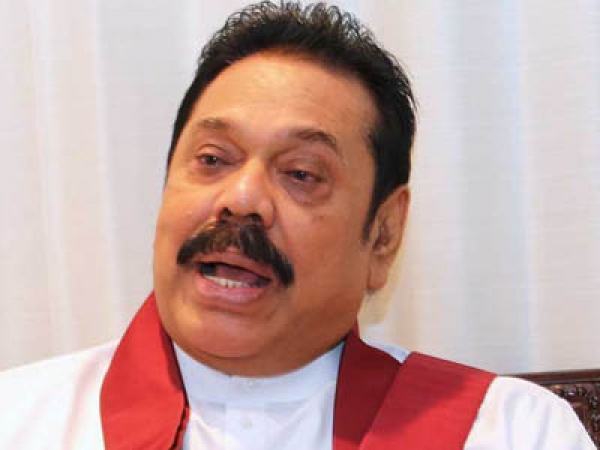Prime Minister Mahinda Rajapaksa said that political parties which were earlier with the UNP that came together to capture power through the presidency and to divide the country after trampling underfoot the majority community, have now shifted their allegiance to the Samagi Jana Balawegaya.
Issuing a statement the PM also said
The leader of the newly formed Samagi Jana Balawegaya was the UNP presidential candidate in 2019. The manifesto that Sajith Premadasa issued for the presidential election titled in Sinhala ‘Sri Lankawe idirigamanata seemawak netha, ekwa gamana yamu’ had a chapter titled ‘Janathawage Vyawasthawa’ on pages 15-16 which contained the following proposals.
• Replacing the word ‘unitary’ with the formulation ‘undivided and indivisible’ in describing the Sri Lankan state.
• Devolving the powers of the central government to the provinces to the maximum extent possible.
• Creating a second chamber of Parliament made up of provincial council representatives to further limit the powers of the central legislature.
• Abolishing the exclusive financial powers of Parliament and allowing provincial councils to raise funds independently.
• Placing the district secretaries and divisional secretaries under the purview of the provincial councils.
• Setting up a separate constitutional court to adjudicate in disputes between the central government and the provincial councils.
The constitutional proposals in Sajith Premadasa’s manifesto are identical to the proposals in the draft constitution tabled in Parliament by UNP leader Ranil Wickremasinghe in early 2019. An essential precondition to the division of this country is to remove from our Constitution the phrase ‘unitary state’ which has a special technical meaning. The international community can then take note of the fact and act accordingly.
The inclusion of constitutional proposals aimed at the division of the country in the manifesto of a major political party, is a cause for grave concern. This document was presented to the Most Venerable Mahanayake Theras and Anunayaka Theras with a great deal of publicity without however giving them any prior warning about its contents. If they had won the last presidential election, these proposals would have been implemented on the claim that it had received a mandate from the people and the blessings of the Maha Sangha.
The political ‘mara-senawa’ that came together to capture power through the presidency and to divide the country after trampling underfoot the majority community, was made up of the same elements in 2010, 2015 and 2019. These political parties which were earlier with the UNP, have now shifted their allegiance to the Samagi Jana Balawegaya on the grounds that Ranil is incapable of winning the required number of Sinhala votes whereas Sajith is better positioned to do so. We see the Samagi Jana Balawegaya trying to fulfil their side of this bargain by giving election pledges such as an allowance of Rs. 20,000 for every family. They tried to win the presidential election also with promises of various handouts.
A political party that caters to a single ethnic or religious community only looks after the narrow interests of that group and considers other communities to be outsiders or even enemies. Our most recent experience of the dangerous consequences of this brand of politics was the Easter Sunday terrorist attack. When a given political party restricts itself to just one ethnic or religious group, they too become prisoners of circumstances.
When the extremist preacher Zaharan Hashim built himself a small following in the East, communal political parties had to compete for the votes of that group. That enabled this extremist to summon all communal candidates for election in that district and even impose conditions on them. Though this process, extremists controlled the communal political parties and the communal political parties in turn controlled the national political party running the government. Ultimately the extremists indirectly controlled the government. The yahapalana government was not able to prevent the Easter Sunday bombings because they had fallen victim to this brand of politics.
G.G.Ponnamabalam was a minister in Sri Lanka’s first post independence government. Even though he was not a member of the UNP, he was a lifelong political ally of the Senanayakes. Until 1975, Alfred Duriappah was a pillar of the SLFP in Jaffna. There were figures like A.C.S.Hameed and M.H.Mohamed in the UNP and Badiuddin Mohamed and Alavi Moulana in the SLFP. All of them represented the Tamil or Muslim communities and were stalwarts of either the UNP or the SLFP. The politics of trampling the majority community underfoot and obtaining privileges for one’s own community through political extortion never existed at that time. The reason why this poisonous political culture has flourished up to this point is because those engaged in such politics have benefitted enormously from it.
The people defeated that brand of politics at the 2019 presidential election. If we are to see the kind of frienship and cooperation that existed between the various communities in this country in times past, we have to ensure that those who engage in narrow minded communal politics are not able to benefit from it. It’s only then that a new generation of Ponnambalams, Duriappahs, Hameeds and Moulanas will emerge from among the younger generation. I request all voters to give us an overwhelming mandate exceeding even that of the presidential election of 2019, in order to put an end to narrow minded communalism in the politics of this country.










